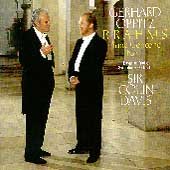| All Artists: Brahms, Oppitz, Davis, Bro Title: Brahms: Piano Concerto No. 1, Ballades, Op. 10 (BMG) Members Wishing: 0 Total Copies: 0 Label: RCA Release Date: 12/14/1993 Genre: Classical Styles: Forms & Genres, Ballads, Concertos, Instruments, Keyboard Number of Discs: 1 SwapaCD Credits: 1 UPC: 090266161829 |
Search - Brahms, Oppitz, Davis :: Brahms: Piano Concerto No. 1, Ballades, Op. 10 (BMG)
 | Brahms, Oppitz, Davis Brahms: Piano Concerto No. 1, Ballades, Op. 10 (BMG) Genre: Classical |
Larger Image |
CD Details |
CD ReviewsAn unexpected, compelling choice with the work's essence Yi-Peng | Singapore | 05/27/2005 (5 out of 5 stars) "This Zimerman recording of the Brahms Piano Concerto no. 1 may have received some critical lambasting when it was originally released. However, despite this, I find that this recording is unjustly underrated because in its own special way it plumbs the depths of Brahms' heart and soul. Zimerman, although he recorded this in his late-twenties, interprets the solo part with insight, and does not go over-the-top with pianistic pyrotechnics, as most other pianists tend to do. Bernstein leads the Viennese musicians in a sympathetic accompaniment that serves as a perfect foil to Zimerman's parts and allows him to integrate into the orchestral texture. And the DG recording, although not entirely clear, is characterised by the atmosphere and bloom of the Vienna Musikverein, despite the extreme forward balance of the piano.
The Introduction may be a little measured on first listening, but Bernstein captures its stark weight and fatalistic intensity that Zimerman's solo playing fits into during his entry. Zimerman's entry in the secondary theme starts off tentatively, but gains in strength, and you can hear the precision of his playing and the rapport he builds with the orchestra. The rest of the movement shows Bernstein and Zimerman in dialogue and maintaining the momentum of this difficult movement, and here the mood of the whole recording is established. Zimerman's insightful interpretation of the solo part is free of pianistic pyrotechnics that show off, such that this is completely in the spirit of Brahms, who didn't want this work to be a virtuoso concerto. I know that the first movement might not be demonic to some listeners, but Zimerman interprets it in the right spirit. The slow movement is perhaps the most meditative and measured, and there is a thoughtfulness about Zimerman's playing. This best suits Brahms' gentle relationship with Clara Schumann. The wind playing is especially noteworthy here, as the wind tone is exceptionally open and clear. Zimerman's spirited rendition of the finale is crisply articulated, and is perhaps the most conventional part of the whole recording. It allows Zimerman to depict the aptitude that Brahms felt in continuing on with his life. The recording quality is larger-than-life such that you can hear the piano in a realistic tone, even despite a lack of clarity in some passages. Overall, I feel that even with some unconventional aspects of this recording, I still recommend it to anyone who wants to hear this concerto. It seems to be in the right spirit that Brahms conceived it, and it plumbs Brahms' psychological mindset through this troubled period of his life." |
